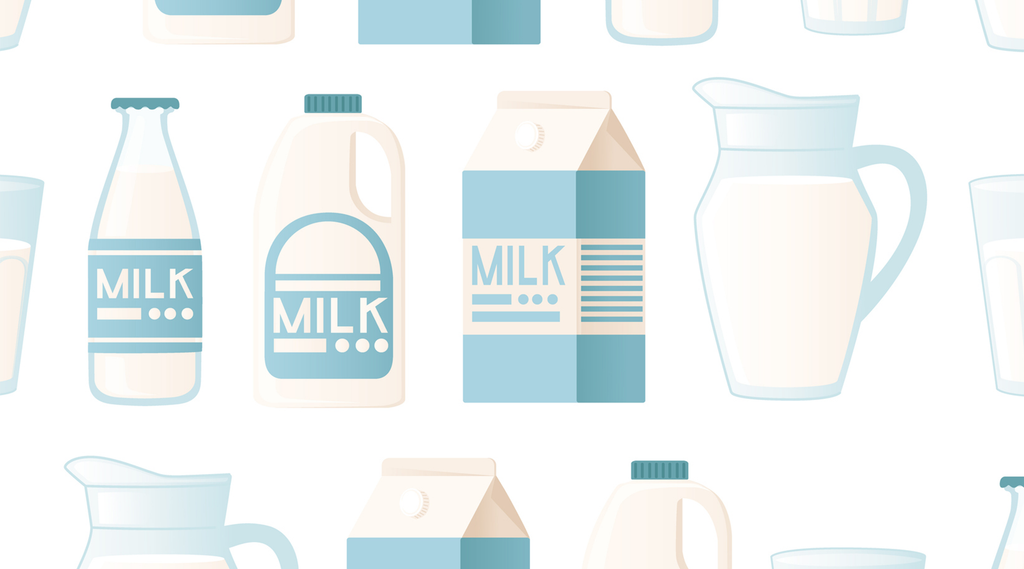Is There a Right Choice When it Comes to Milk?

Is there a right choice when it comes to milk? Well, that depends on who you ask! This question has loads of answers, especially nowadays. Just twenty years ago, the plant-based milk trend was barely starting, and most people didn’t even realize they had options! But now, if there’s a plant or nut out there, you can bet there’s a “milk” made from it ready for your morning latte. So, which one should you choose? Well, like I said earlier, that all depends on you and your taste buds! Let’s dive into the top choices available today.
Whole Milk
"Whole milk" is milk straight from the cow with all its fat intact, about 3.25% milk fat. This fat gives it that silky-smooth texture we love in our lattes. Other options like 2%, 1%, and skim (0.5%) milk have less fat, which can make them taste less smooth. Some people prefer non-fat milk to avoid that "heavy" feeling. If someone orders a "skinny" drink, it means they want non-fat milk. As you can see, there are plenty of cow's milk options. Personally, I go for whole milk in my morning coffee almost every day. But not everyone chooses cow's milk for various reasons. Some people are lactose sensitive, intolerant, or allergic. Lactose is a sugar in all mammal milks, including cow's, goat's, sheep's, and even human milk. Plenty of folks can't digest lactose well, so cow's milk isn't a good option for them. Another reason to skip cow’s milk is if you don’t consume animal products, like if you’re vegan. There are plenty of reasons to avoid cow's milk, or to prefer it, but what other options do we have? Let’s explore some alternatives!
Almond Milk
Let's move on to another classic: almond milk. Almond milk is made by soaking crushed or ground almonds in water, extracting their fats and flavor. The result is a white liquid that can be used just like cow's milk. To give it a similar texture and sweetness, producers add a few extra ingredients. Almond milk is a popular "healthy" alternative due to its low calorie and fat content—only 30 calories per cup compared to whole milk’s 150 calories. If you're watching your calorie intake, almond milk might be a great choice! It works well in both iced and hot drinks. Personally, I find that hot almond milk, used in lattes and other hot espresso drinks, has a strong almond flavor that can overshadow other flavors. It's also a bit thinner, which might not be everyone's cup of tea. But in iced drinks, almond milk mixes perfectly with cold brew and is a fantastic option. However, if you're allergic to almonds or other tree nuts, almond milk isn't for you. But overall, it's a fantastic non-dairy alternative that's worth a try!
Oat Milk
Oat milk: the golden child of the barista world! It's a relatively new player in the dairy alternative game, but don't let that fool you—oat milk is a delicious option that’s dairy-free, nut-free, and gluten-free, making it a naturally allergy-friendly choice. Oat milk is creamy and sweet, much like whole milk. If you want to switch up your milk without losing that whole milk “experience,” I highly recommend giving oat milk a try. Oat milk and whole milk have similar calories, fat, and sugar content, making the transition from one to the other pretty seamless. It works great in both hot and iced drinks, retaining its richness and creaminess in hot beverages and mixing well in iced ones to enhance your iced coffee. Personally, oat milk is my top pick for anyone looking to try a new milk for the first time. I love it and often switch it out for my usual whole milk. Of course, if you're allergic to oats, this won’t be a good option for you. But generally, oats don’t pose many allergy concerns. Many baristas around the world primarily serve two milks: whole milk and oat milk. So, if you’re looking to switch things up, oat milk is a fantastic place to start!
Soy Milk
Soy milk is another fantastic option! Made by soaking soybeans in water, then grinding them up and extracting the liquid, soy milk is luscious in texture and lower in calories than whole milk, clocking in at about 80 calories per cup. Its creamy texture comes from the high protein content—7 grams per cup! So, if you're looking to cut back on calories while boosting your protein intake without dairy, soy milk is a great choice. Soy milk works well in both hot and iced drinks, keeping its silkiness no matter the temperature. It does contain isoflavones and phytoestrogens, which mimic hormones in the human body, specifically estrogen. For some people who are sensitive to hormones, soy milk might not be the best option. However, the isoflavones in soy milk are quite low (around 6 mg per cup), so it's generally not something to worry about, but it's good to be aware. Soy milk was the first big “alternative” milk to hit the scene and has stayed popular for good reason. So, give it a try next time you're looking to switch things up!
Coconut Milk
Lastly, let’s talk about coconut milk! This delicious and flavorful alternative is made by soaking coconut “flesh” in hot water and then separating the solids from the liquid. Coconut milk has a distinct coconut flavor that really stands out in any beverage. Unlike oat or soy milk, where the flavor is subtle, coconut milk's taste is unmistakable. While it’s not as silky as whole milk, coconut milk has a lower calorie count—about 40 calories per cup. These calories come from the fat in the coconut flesh, making it a great option for those following a keto or low-carb lifestyle. I personally love coconut milk in hot lattes. It has a texture similar to whole milk thanks to its fat content, and I enjoy the unique coconut flavor it adds to drinks. However, not everyone loves the taste of coconut, so it might not be the best option for them. Coconut allergies are rare, but if you think it might apply to you, be cautious. On the bright side, coconut milk is naturally dairy and gluten-free, making it an excellent choice for those with these sensitivities. Coconut milk is a fun and tasty way to switch up your coffee routine, so why not give it a try?
Find What Works For You
Ultimately, the world of milk alternatives is vast and varied. There’s macadamia nut milk, barley milk, hemp milk, rice milk, pea milk, hazelnut milk, cashew milk—the list goes on! If it’s a nut or a grain, chances are there's milk made from it. So, which milk is right for you? There’s no one-size-fits-all answer. It all comes down to your taste and nutritional needs. If you're not sure which milk to try or want to explore new options, just ask your local barista what they have! Many coffee shops offer a variety of choices, so don’t hesitate to chat with them. Discovering coffee is all about finding what tastes good to you and what you want out of your cup. Only you can decide the best option for you, so dive in and enjoy the journey!
This blog was written by Brett Evans
